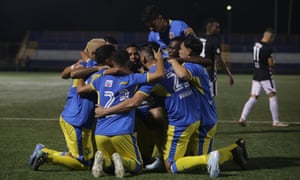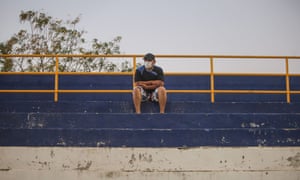‘Our players are afraid’: Nicaraguan football ploughs on amid the crisis | Football
On Wednesday night the players of Diriangén, the oldest club in Nicaragua, will put on their face masks before they line up for kick-off and hope for the best. They are third in the country’s Liga Primera and a home match against fourth-placed Walter Ferretti offers a chance to put the heat on those ahead while widening the six-point gap between the sides.
It is tight at the top but Diriangén have little appetite to compete and will do so from obligation alone. Nicaragua’s league is one of only three competitions in the world – with Belarus and Burundi – continuing to operate during the coronavirus crisis and the decision to press on has sparked fear and disbelief.
“Our players do not want to continue playing,” the Diriangén general manager, Sergio Salazar, says. “They are very afraid and we understand them. We want to suspend the tournament but all the clubs have voted and the majority want to continue.”
Although circumstances are being reviewed weekly in a country that has publicly confirmed five cases of Covid-19, Diriangén were the only club to oppose the league’s continuation at its 10 clubs’ latest meeting on Tuesday. The line from most of their rivals, including Wednesday’s opponents, is that they will play until the ministry of health says it is unsafe to do so. It is virtually impossible to find anyone elsewhere in the division who will go on record to deviate from that view.
Unpicking the situation requires a journey into the complex and murky world of Nicaraguan football. A condensed explanation is that almost all roads lead to the country’s president, Daniel Ortega, a strongman for whom football represents a potent arm of internal power and a vision of stability to the outside world.
Diriangén are understood to be the only top-flight club with little or no funding from an arm of the state, although four would describe themselves as privately owned. It makes them outliers in a deeply repressive environment in which most of those competing are entirely dependent on direction from above.
Ortega’s regime wobbled in April 2018 when a protest movement took to the streets; it was neutralised bloodily but a series of general strikes followed and the country’s economy has nosedived. Halting the football season – and indeed the more popular baseball league – would present the impression things are spiralling beyond control again.

“Not stopping the league is a result of the government’s urgency to prove a normality that doesn’t exist,” the journalist Camilo Velásquez says. “Since 2018 they’ve been desperate to show things are back to normal and part of that includes functioning sports. Coronavirus became a big threat because they are scared of a general strike and shutting everything down would pretty much allow that.”
So football carries on. The Guardian interviewed two players from other teams and neither expressed doubts about persisting. “There is no concern on my part,” says the Walter Ferretti forward Dshon Forbes. “My job is to play and while the institution in charge of health does not suspend these activities everything continues as normal.”
Pablo Gállego, a Spanish winger playing for Managua, adopted a near-identical tone and described himself as “super-happy” with the club’s care. “If I felt my physical integrity was at risk I’m sure I could talk to them but we feel safe and feel appropriate measures are being taken,” he says.
Walter Ferretti are owned by the Nicaraguan police force, and Managua’s players are paid by the capital city’s mayoral office. That is not to reject the footballers’ opinions out of hand but the incentives to opt against dissent are significant in a country believed to have 73 political prisoners.
“Players are very, very scared,” explains Velásquez, who says a number have messaged him privately to say they feel helpless and forced to play. “When their income is football and the state is paying their salary, you can understand why they’ll remain quiet.”

There have been a few flickers of support for Diriangén’s stance. Real Madriz, who are seventh in the league, appeared to have stuck their head above the parapet when they announced on social media they would not fulfil their match at Real Estelí on 22 March. But that message was mysteriously taken down; Madriz turned up and lost the game, traditionally a home banker, 4-0.
Public opinion, already low after a perceived lack of support from the nation’s players during the uprising of 2018, appears firmly in favour of a pause. But, while club Twitter accounts remind their fans “Quédate a casa” (“Stay at home”), their teams continue to compete, albeit behind closed doors since the most recent round of games. “It is uncomfortable for the players but they prefer to use masks,” Salazar says. It is an arresting, uneasy image and one that brings the situation’s absurdity home.
One of Diriangén’s stars, the Costa Rican forward Sebastián Barquero, has been allowed to return home and players have been told there will be no recriminations if they decide to down tools.
In the meantime everyone else awaits evidence that Ortega’s version of normality bears some resemblance to the reality inside the country’s hospitals and on the streets. “The first thing we have to take care of is the health of our people,” Salazar says. “We continue to think we should not play.”



